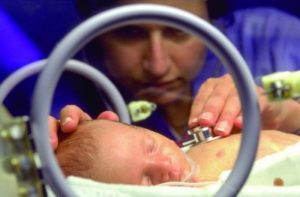Premature Birth Can Be a Risk Factor for Cerebral Palsy
Most people are familiar with some of the more-common health issues that can affect premature babies such as underdeveloped lungs, slow development, and sometimes even learning issues, but these are not the only issues with which parents of preemies must be aware.

Premature Babies & Cerebral Palsy
Any baby born before the 37th week of gestation is considered premature, and premature children can differ in various aspects of their development. While the developmental issues for most premature infants are short-lived, others may suffer serious injuries that cause long-term problems.
Anywhere from 40-50 percent of children with cerebral palsy were born preterm. These children are not fully developed at birth, which increases the chances that they may end up suffering a brain injury that leads to the development of cerebral palsy.
Neurological Injuries to Preemies
Any head trauma or malformation of a child’s developing brain can result in the development of severe neurological disorders. Many children who suffer from neurological birth injuries suffer only motor system impairment. Some children may also develop cognitive disabilities or may be prone to seizures. Additionally, many children may experience other symptoms, such as:
- Problems with vision, speech, or hearing.
- Hypersensitivity to various types of stimuli.
- Problems with both attention and activity.
- Irregular sleep patterns.
This is not to say these types of difficulties don’t affect full-term infants, but they are more-common in preterm births.
Any impairments to a child’s motor system may take time to emerge, and are usually noticeable during the first few months of the baby’s life. If you notice that your child is not reaching expected developmental milestones (such as crawling, verbalizing, etc.) on time, it’s vital that you speak to your child’s doctor.
It’s important to diagnose any developmental issues as soon as possible so that treatment can begin immediately. While the brain damage that causes cerebral palsy cannot be reversed, the symptoms can be treated. The sooner treatment begins, the better your child’s prognosis will likely be.
Potential for Cerebral Palsy
As stated above, premature babies face an increased risk of incurring a brain injury due to trauma or even infection. The child’s APGAR score may indicate a cause for concern, but the earliest signs of cerebral palsy tend to involve muscle tone and motor skills.
Even though early diagnosis is essential, it can be very difficult to confirm a clear diagnosis of any neurological development issues during the early stages of infant development.
Specific impairments that occur because of a brain injury will vary in individual children, as will their responsiveness to various treatments. If you have concerns about your child, discuss them with your their doctor.
